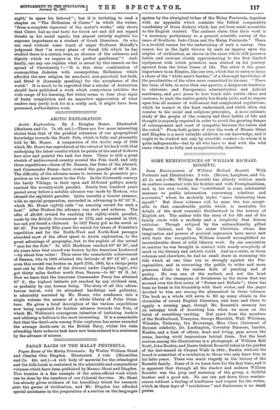PAGAN RACES OF THE MALAY PENINSULA.
Pagan Races of the Malay Peninsula. By Walter William Skeet and Charles Otto Blagden. Illustrated. 2 vols. (Macmillan and Co. 42s. net.)—A rich body of material for the ethnologist and the folk-lorist is contained in the admirable and compendious volumes which have been published by Messrs. Skeat and Blagden. This treatise is a fine example of the extra-official work which can be done by the members of our Colonial Services. Mr. Skeet has already given evidence of his hereditary talent for research .into the germs of civilisation, and Mr. Blagden has afforded special assistance in the preparation of §ion on the languages
spoken by the aboriginal tribes of the Malay Peninsula, together with an appendix which contains the fullest comparative vocabulary of these dialects which has yet been made accessible to. the English student. The authors claim that their work is "a necessary preliminary to a general scientific survey of the races of Southern Indo-China and the Malay Peninsula." There is a twofold reason for the undertaking of such a survey. One reason lies in the light thrown by such an inquiry upon the origins of civilisation, as shown in the races which still preserve habits and customs closely approximating to the first limited equipment with which primitive man started on his journey upward from the lower forms of life. The other is the great importance to an Empire, like our own, which has to carry so large a share of the "white man's burden," of a thorough knowledge of the peculiarities of the alien races committed to its care. "There has been, of late, in more than one quarter, a dangerous tendency to elaborate and Europeanise administrative and judicial machinery, and pan i passu to lose touch with native ideas and customs, to push the native gently but firmly aside, and to impose upon him all manner of well-meant but complicated regulations, which he cannot in the least understand, and which often run counter to his social and religions principles, A more intimate study of the people of the country and their habits of life and thought is urgently required in order to avoid the growing danger of estrangement and want of sympathy between the rulers and the ruled." From both points of view the work of Messrs. Skeet and Blagden is a most valuable addition to our knowledge, and it ought to be studied not only by scientific readers—to whom it is quite indispensable—but by all who have to deal with the wild races whom it so fully and sympathetically describes.






















































 Previous page
Previous page